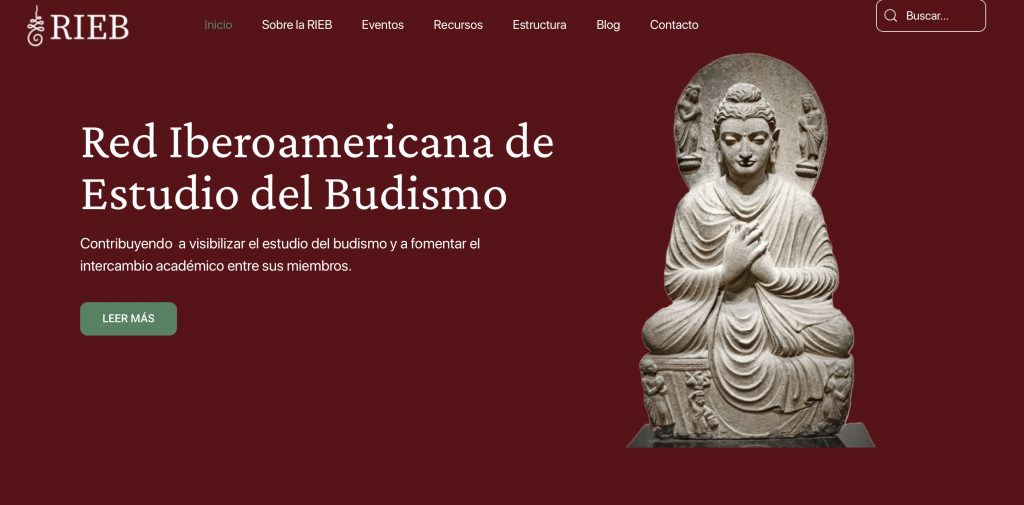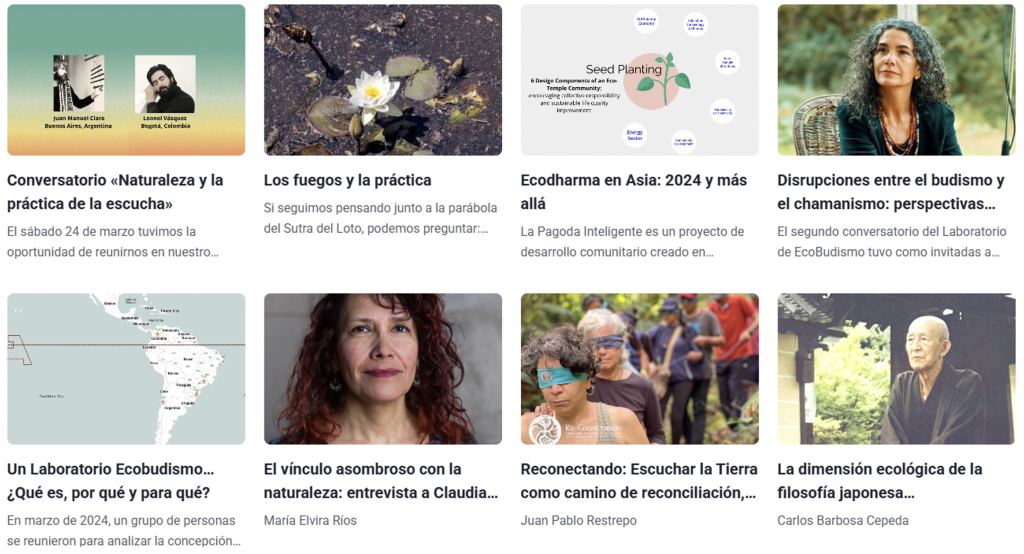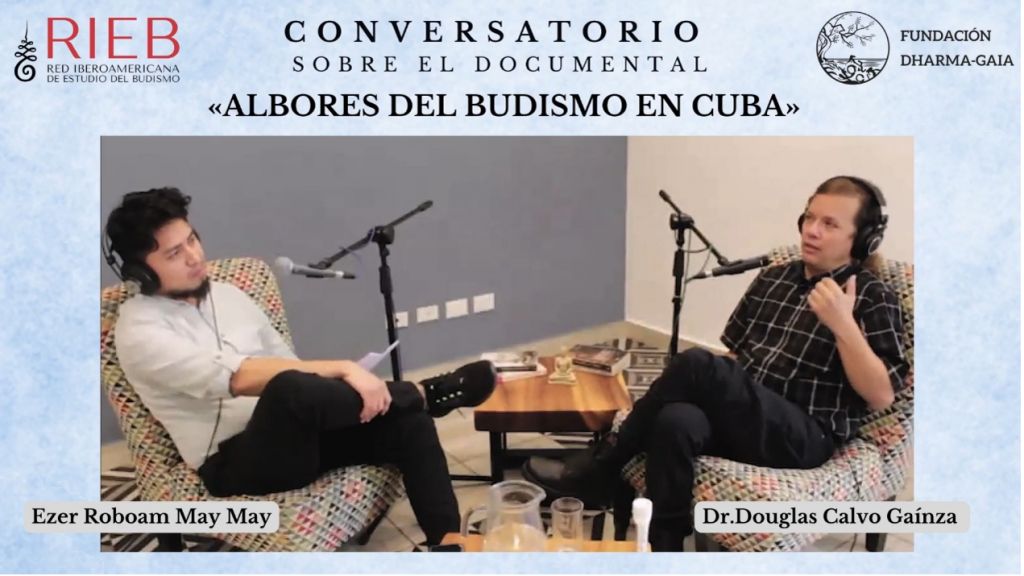This item is part of our special edition”Buddhist Education in Latin America and Spain”
In recent decades, the study of Buddhism in Ibero-America has experienced remarkable growth in academic and cultural fields. However, challenges still persist, such as the geographical distance between researchers, the scarce articulation of collaborative networks and the limited international visibility of their contributions. So far, these difficulties have hampered the consolidation of an organized, integrated and participatory study and research community in our linguistic and cultural region.

In this scenario, the recent constitution of the Ibero-American Network for the Study of Buddhism (RIEB) marks a milestone in the history of Buddhism in the Spanish-speaking space. This association —of a non-confessional and non-partisan nature, with its own legal personality and Ibero-American reach— is a platform created to articulate academic efforts, promote interdisciplinary dialogue and project to the world the knowledge generated in the region about this spiritual tradition. In doing so, the RIEB responds both to the scientific needs of its members and to a collective desire for strengthening and visibility.
A context of fragmentation: the origins of the RIEB.
Historically, the study of Buddhism in Ibero-America has developed in a fragmented manner. Researchers, translators, teachers and publishers have worked in relative academic and institutional isolation, with limited resources and few opportunities to meet. Although their research and publications are valuable, they have remained invisible and lack common spaces for dialogue and cooperation. At the same time, interest in Buddhism has grown in universities, cultural centers and among the general public; however, the lack of an organized structure has made it difficult to consolidate an articulated field of study and research.
In recent years, significant steps have been taken towards greater academic and inter-institutional coordination of the field. Since 2019, the portal Buddhistdoor in Spanish has established itself as a pioneering reference in the dissemination of reflections and research on Buddhism in the Spanish-speaking community, contributing to a first regional cohesion. Soon after, the Dharma-Gaia Foundation (FDG) was born, which has promoted university education, research, translation and publication in Spanish through its two publishing labels, as well as collaborative meetings between different organizations.
In this context, thematic works have been published that have made visible the work of researchers in the region. Among them, the collection stands out Buddhist Studies in Latin America and Spain, vol. I-II, which has represented a valuable opportunity for cooperation between specialists in the region and has opened up lines of collaboration that continue to this day. These experiences have demonstrated not only the potential for long-term cooperation, but also the need for a more stable framework for coordinating efforts.
At the end of 2022, this need for articulation took shape when Daniel Millet Gil —executive editor of B.uddhistdoor in Spanish (BDE) and director of the Dharma-Gaia Foundation— and the Argentinian anthropologist Catón Carini —a CONICET researcher, recognized for his studies on Buddhism in Latin America—proposed creating an Ibero-American network of researchers and specialists dedicated to the academic study of Buddhism, with a critical, interdisciplinary and rigorous approach.
On the basis of this initiative, a sponsoring committee was formed, comprised of academics from various countries: the Cuban Douglas Calvo Gaínza; the Chilean María Elvira Ríos Peñafiel; the Spaniard Daniel Millet Gil; the Argentinians Lía Rodríguez de la Vega, Catón Carini, Belén Azarola, Denisse Welsch and Federico Andino; the Uruguayan Ismael Apud; the Mexican Ezer R. May May; and the Colombians Daniela Mesa Sánchez, Carlos Barbosa and Juan Pablo Restrepo. His careers cover disciplines such as philosophy, political science, anthropology, history, psychology and Buddhist studies. They were the main drivers of the initial meetings.
The RIEB was legally constituted in Argentina — the country of residence of most of the promoters — on February 4, 2025, through the signature before a notary public of six of the twelve founding members. This event marked a milestone in the process of institutionalizing Buddhist studies in the region.

What is the RIEB and how does it work:
The Ibero-American Network for the Study of Buddhism is an interdisciplinary scientific community dedicated to the research, training and teaching of Buddhism in Ibero-America. It is a non-profit, inclusive, non-denominational entity free of party affiliations, which guarantees a neutral and open space for the exchange of knowledge and ideas. Its central purpose is to promote rigorous research, academic exchange and interdisciplinary collaboration, promoting an in-depth analysis of this ancient tradition in its many manifestations.
The scope of the RIEB includes Ibero-America —that is, Latin America, Spain and Portugal—. Its official languages are Spanish and Portuguese, which favors the circulation of knowledge in the region and enhances transatlantic cooperation.
The Network approaches Buddhism from the social sciences, the humanities and the Buddhist studies themselves, integrating disciplines such as sociology, philosophy, history, art, economics, anthropology and linguistics. This interdisciplinary approach enables comprehensive understanding and promotes a dialogue in accordance with the cultural and linguistic diversity of the region. Key issues include the teaching of Buddhism in the academy; philology and the translation of canonical texts; the reception and reinvention of Buddhism in Ibero-America; its links with art and education; ecology and sustainability; and gender and female leadership in Buddhist communities
The mission of the RIEB is to strengthen the academic analysis of Buddhism in the region, highlighting the cultural and social peculiarities typical of Ibero-America. It aspires to consolidate itself as the main academic reference in this part of the world, creating an accessible, respectful and innovative space that facilitates the development of a solid scientific community, the exchange of ideas and the generation of knowledge around Buddhist teachings, traditions and practices.
The Rieb's governance structure is designed to ensure democratic and efficient management. The General Assembly is the supreme decision-making body, which meets annually, either in person, virtually or in a hybrid manner. The Steering Committee executes the work plan and is composed of a presidency, a vice-presidency, an executive secretariat, a treasury and regional offices.
The RIEB envisages a wide range of actions to promote its objectives: the preparation of an annual work plan; the publication of a monthly digital bulletin; the organization of a biannual congress —in face-to-face and virtual format—; the creation of working groups; the launch of an academic journal on Buddhist studies in Ibero-America; support for research and joint publications; and the establishment of agreements with related institutions.
In addition, the Network will organize conferences, seminars and workshops; support research projects; promote the publication of articles, books and theses; and promote the creation of training and research centers with an interdisciplinary perspective. Recurrent thematic axes include the translation of canonical texts, the impact of Buddhism on contemporary society, its links with ecology, female leadership in Buddhist communities and its influence on art and culture
The RIEB is governed by fundamental principles that guarantee its integrity and relevance: non-partisanism and non-confessionality, to maintain absolute neutrality on political and religious issues; academic integrity and collegial review, to ensure quality through rigorous evaluation processes; the inclusion of diversity, embracing all Buddhist traditions and promoting cultural diversity; and environmental commitment, prioritizing virtual or hybrid formats to reduce the ecological footprint, minimizing material impact and integrating ecology as a cross-cutting line of research.
In short, the RIEB not only aspires to contribute to the development of Buddhist studies in Ibero-America, but also to facilitate intercultural dialogue and mutual understanding between Buddhist traditions and the region's sociocultural contexts. Its commitment to the dissemination of knowledge and academic collaboration positions it as a key platform for the analysis and exploration of this ancient tradition.
The importance of an Ibero-American perspective.
One of the Rieb's most innovative contributions is its emphasis on an Ibero-American perspective, one of the most linguistically and culturally integrated areas of the world, which transcends geography to incorporate an epistemic framework sensitive to the region's historical, cultural and social specificities. Instead of replicating models from the global north, the network promotes its own perspective, influenced by decolonial processes, migrations and community dynamics.
This allows us to explore unique questions: “How is Buddhism adapted to Latin American and Iberian contexts? What role do migrant communities play in their dissemination? How do your teachings dialogue with problems such as inequality, the environmental crisis or political conflicts?” By making these perspectives visible, the RIEB enriches global knowledge of Buddhism, questioning Eurocentric narratives and promoting a plural and critical approach.
Unalome.
Since its inception, the visual identity of the RIEB has incorporated the unalome —symbol of the Buddhist path to enlightenment—, with a sober typography and a color palette inspired by temples and Ibero-American cultural wealth, which merges tradition and modernity.

How to participate:
The RIEB envisages three ways of integration:
Effective members: people with undergraduate or postgraduate degrees in related areas who work in teaching, research, editing, translation or dissemination.
Adherent members: people without a university degree who show interest and participate in network activities (workshops, seminars, projects).
Honorary members: appointed by the assembly for their merits and services to the network.
The admission process consists of submitting an application addressed to the presidency, which is evaluated and resolved by the Steering Committee. The Assembly must ratify all admissions. The application must be accompanied by a curriculum vitae and copies of the corresponding academic qualifications, in the case of individuals, or of the constituent documents, in the case of legal entities. The membership lasts an annual period and must be renewed each year. For inquiries and applications, you can access the Rieb's official website or establish contact through its institutional social networks.
Outstanding Achievements: Building a Knowledge Network.
The RIEB brings together similar trajectories and responds to a latent need for academic cooperation. Since 2023, it has deployed an active agenda that has consolidated it as a dynamic space for researching, teaching and disseminating Buddhism in Ibero-America. Its main milestones include:

First International Days on Buddhism and Ecology (October 2023)): brought together specialists to address the environmental crisis from an interdisciplinary perspective that integrates science and Buddhist teachings. From this work, the documentary emerged ”The state of the planet today: future projections and a Buddhist perspective”, narrated by Jordi Solé Ollé and edited by Daniela Mesa. The work combines data on climate change with concepts of interdependence and compassionate action.
The EcoBuddhism Laboratory (LEB), promoted by the RIEB and the FDG and coordinated by María Elvira Ríos Peñafiel, promotes dialogue between ancient knowledge, scientific research and Buddhist community action. Among his initiatives, he has developed a series of podcasts and talks focused on ecodharma, relational animism and regenerative practices, inspired by Buddhist principles that promote harmony between human beings and nature.

The video presentation of Buddhist studies in Latin America and Spain (vols. I and II), published by the Fundació Universitat Rovira i Virgili and the Dharma-Gaia Foundation, offers a historical, philosophical and sociological analysis of Buddhism in the region. Volume I (August 2024) and volume II (March 2025) bring together contributions from multiple authors. The full list of authors can be found in the credits of each volume. Both volumes incorporated specialized bibliography by country, updated until 2022.

Presentation of the documentary Dawn of Buddhism in Cuba (March 2024). Directed by Douglas Calvo Gaínza, this documentary explores the history and impact of Buddhism on the island. Its launch included a conversation with Ezer R. May May, which enriched the analysis of the Cuban cultural context.

Digital Presence:
Through their website (https://redestudiobudismo.com) and its social networks (Facebook, Instagram and YouTube), the RIEB offers resources such as directories, bibliographies, filmographies, podcasts and a digital library with translations and introductory works. This digital platform facilitates access to knowledge and encourages interaction between researchers and the general public.

Transparency and sustainability
In accordance with its statute, the RIEB is financed through donations, public and private grants, annual fees established by the assembly, and revenues derived from its own activities. The charges are ad honorem, with the possibility of compensating expenses when appropriate. An independent prosecutor's office oversees administrative and financial management, and is empowered to propose corrective measures, strengthening institutional transparency. In addition, the Rieb's environmental commitment is reflected in the organization of events in virtual or hybrid formats, as well as in the implementation of actions aimed at reducing the material impact of its activities.
Projects
The RIEB will hold its first General Assembly in April 2026.
The RIEB will promote the creation of an Ibero-American journal of Buddhist studies, inspired by the legacy of Fernando Tola and Carmen Dragonetti. The publication aims to consolidate itself as a regional reference, with peer evaluation and bilingual sections in Spanish and Portuguese.
In October 2026, the Second Days of Buddhism and Ecology will be held, with the purpose of deepening the dialogue between Buddhist thought and contemporary environmental challenges.
Finally, the First Ibero-American Congress on Buddhist Studies will be organized, aimed at articulating academic networks, promoting collaborative research and making regional production visible.
Challenges and Perspectives: The Future of the RIEB
Despite the advances, the RIEB faces key challenges, including: ensuring its sustainability through strategic alliances; expanding diversity by incorporating marginalized voices to strengthen plurality; and consolidating its international projection through links with related networks that make Ibero-American contributions visible in the global arena.
Conclusion: Weaving a Transformative Future
The RIEB is not just an academic network: it is a bridge between traditions, disciplines and territories that seeks to transform knowledge about Buddhism from inclusive and critical perspectives. In an interconnected world, his work invites us to rethink Dharma from a situated and plural perspective, reinforcing the links between Ibero-American communities and the Buddhist legacy.
Thanks to the support of the Dharma-Gaia Foundation and the commitment of all its members, the RIEB will continue to expand and consolidate itself as an academic and cultural reference. Each contribution adds to its mission to build an accessible and innovative space for the study and dissemination of Buddhism in the region.
Links:
Sito web: “RIEB — Ibero-American Network for the Study of Buddhism”
Facebook: Ibero-American Network for the Study of Buddhism: RIEB
YouTube: https://www.youtube.com/channel/UC4qgUGZVMcogSjFcN_OKfmA
Articles published in Buddhistdoor in Spanish
”The situation of Buddhist studies in Spain: educational programs” by JUAN ARNAU NAVARRO, MONTSE CASTELLÀ OLIVÉ, FRANCISCO DIEZ DE VELASCO, RICARDO GUERRERO DIÁÑEZ, BASILI LLORCA MARTINEZ, DANIEL MILLET GIL, AGUSTÍN PÁNIKER VILAPLANA, ALEIX RUIZ FALQUÉS, JAUME VALLVERDU, ABRAHAM VÉLEZ DE CEA.
”Buddhist studies in Argentina”. First Part: The Origins” by CATON CARINI AND BELEN AZAROLA.
Buddhist studies in Latin America and Spain (Volume I), edited by Daniel Millet Gil and Jaume Vallverdu Vallverdu. This first volume brings together a series of essays that explore the relationship between Buddhism and Spanish-American culture, addressing issues such as the reception of Buddhism in Latin America and Spain, the translations of Buddhist texts into Spanish and the impact of Buddhism on contemporary societies.
Buddhist studies in Latin America and Spain (Volume II), edited by Daniel Millet Gil and Jaume Vallverdu Vallverdu. The second volume expands the focus of the first, including contributions that analyze Buddhism from interdisciplinary and regional perspectives, with an emphasis on its interaction with local cultural traditions and its impact on the academic environment.
Both volumes are available in PDF format and can be downloaded free of charge through the following links First volume And Second volume










